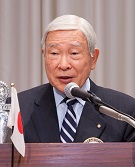��Rotary Foundation Month�� Meeting
November 8, 2017
Mr. Kakutaro Kitashiro
Chair of the Board of Trustees,
International Christian University
�� Today let me talk about the historical relationships between Tokyo RC and International Christian University (ICU), for which I serve as Chair of the Board of Trustees, and the significance and role of the ICU Rotary Peace Center.
Today let me talk about the historical relationships between Tokyo RC and International Christian University (ICU), for which I serve as Chair of the Board of Trustees, and the significance and role of the ICU Rotary Peace Center.
��The founding principles of ICU were laid down by Japanese and North American Christian leaders and educators in 1949 with the goal to nurture talents who would contribute to defend peace and democracy for all mankind. The first ICU Chair of the Board, Mr. Kiyoshi Togasaki, was the first Japanese person who served as President of Rotary International. It was in 1953 when ICU opened as the first four-year liberal arts college in Japan to ��nurture talented individuals who would help build a free, democratic Japan and contribute to the peaceful development of human society.�� Let me highlight that ICU has been supported by the goodwill of many people regardless of religion since its inception. In 1948, a supporting organization led by Bank of Japan Governor, Hisato Ichimada, coordinated fund-raising efforts and achieved the targeted 150 million yen despite the challenging period immediately after World War II.
��In 2002, the Rotary Peace Center was established at the ICU Graduate School with the support of Rotary Foundation. Generous contributions by many Rotarians also led to the completion of the ��Togasaki Kiyoshi Dialogue House�� in 2010 as part of the 60th anniversary projects. ICU was selected by the Ministry of Education as a ��Super Global University�� in 2014 for its strong commitment to internationalizing Japanese universities as global leaders in higher education.
��To give you an overview of ICU, currently there are about 3,000 students from nearly 50 countries studying at a verdant 620,000-square-meter campus located on the outskirts of Tokyo. All the undergraduate students join the ��Division of Arts and Sciences, College of Liberal Arts�� and all the graduate students join the ��School of Arts and Sciences.�� Based on ICU��s belief in ��later specialization,�� undergraduate students decide on their major (areas of specialization) at the end of their second year, after taking fundamental courses from a selection of 31 majors in the humanities and sciences to identify their individual interests and aptitudes. Students study in small groups focused on extensive discussions and group works to encourage active learning and develop key critical-thinking and problem finding/solving capacities. 36% of the faculty members are of foreign nationalities, creating an educational environment rich in diversity. ICU curriculums are based on Japanese-English bilingual education and all the students should acquire both Japanese and English abilities to get a degree. ICU also provides extensive study-abroad programs and 60.8% of the students join one of the 58 programs conducted at 91 universities in 42 countries. ICU also has international exchange agreements with 71 leading universities in 23 countries where third-year students study for one academic year with their credits being transferred back to ICU.
��The Rotary Peace Centers have been established at seven universities around the world and ICU was selected as the only institution in Asia offering a two-year Master��s Degree program. The ICU Rotary Peace Center has accepted around 10 Peace Fellows every year since the program started in 2002. To date, 62 fellows from the Americas, 18 from Europe, 13 from Africa and 39 from Asia and the Pacific have pursued their academic career. Six Rotary Districts located in the vicinity of ICU form the ��Host Area Liaison Council�� and provide extensive support to the Center and fellows, such as organizing orientations and seminars. Every year, each District selects Counsellors for individual fellows who serve as his/her ��family in Japan��.
��Among various activities conducted by the Peace Centers, the ��Peace Forum�� is a unique initiative organized by ICU where speakers from international organizations and NGOs are invited to share their suggestions and insights. We also organize a field-study in Hiroshima every March, supported by generous contributions made by 90,000 Rotarians. Peace fellows have their internship during academic break at institutions outside of their home country. To conclude the two-year program, each fellow makes an academic presentation on his/her research field related to pressing global challenges, such as human security, disaster management and conflict prevention. After completing the program, the majority of fellows join NGOs, educational institutions, governmental agencies and international organizations where they put their research findings into practice.
��Rotary International has praised the ICU Rotary Peace Center for its excellent activities and well-organized support provided by Host Areas and respective RCs. Comments made by fellows highlight the importance of continued and persistent dialogue as well as analytical and critical thinking to identify sustainable solutions.
��Thanks to your generous support, the ICU Rotary Peace Center marked its 15th Anniversary this year. Let me ask for your further assistance to serve as Host Counsellor for the fellows. Before closing my speech, let me emphasize that Rotary and ICU are both committed to ��service�� as we strive for the betterment of humanity. I would like to ask for your continued support and understanding for the ICU Rotary Peace Center and fellows dedicated to their study and research. Thank you.